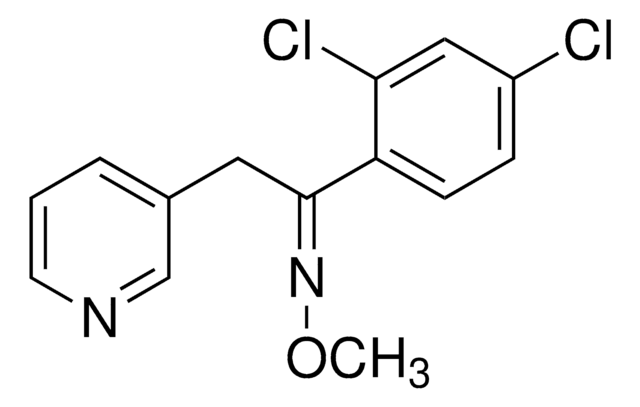45657
S 421
PESTANAL®, analytical standard
Synonym(s):
Bis(2,3,3,3-tetrachloropropyl) ether
About This Item
Recommended Products
grade
analytical standard
Quality Level
product line
PESTANAL®
shelf life
limited shelf life, expiry date on the label
technique(s)
HPLC: suitable
gas chromatography (GC): suitable
application(s)
agriculture
environmental
format
neat
SMILES string
ClC(COCC(Cl)C(Cl)(Cl)Cl)C(Cl)(Cl)Cl
InChI
1S/C6H6Cl8O/c7-3(5(9,10)11)1-15-2-4(8)6(12,13)14/h3-4H,1-2H2
InChI key
LNJXZKBHJZAIKQ-UHFFFAOYSA-N
Looking for similar products? Visit Product Comparison Guide
General description
Application
- Tobacco samples by citrate QuEChERS (quick, easy, cheap, effective, rugged and safe) extraction in acetonitrile solvent, low-temperature precipitation (LTP) and dispersive solid phase extraction (d-SPE) followed by analysis using gas chromatography combined with tandem mass spectrometry (GC-MS/MS) with electron impact (EI) ionization and selected reaction monitoring (SRM) detection.
- Fresh tea shoots, tea infusion and spent tea leaves by GC coupled with 63Ni electron capture detector (ECD) and GC-MS operating on EI mode of detection.
- Indoor air samples by GC-EI-MS equipped with selected ion monitoring (SIM) detection.
Legal Information
Not finding the right product?
Try our Product Selector Tool.
Storage Class Code
10 - Combustible liquids
WGK
WGK 2
Flash Point(F)
350.6 °F
Flash Point(C)
177 °C
Personal Protective Equipment
Choose from one of the most recent versions:
Certificates of Analysis (COA)
Don't see the Right Version?
If you require a particular version, you can look up a specific certificate by the Lot or Batch number.
Already Own This Product?
Find documentation for the products that you have recently purchased in the Document Library.
Our team of scientists has experience in all areas of research including Life Science, Material Science, Chemical Synthesis, Chromatography, Analytical and many others.
Contact Technical Service








